| Listing 1 - 9 of 9 |
Sort by
|
Book
Year: 2011 Publisher: Chicago, IL : University of Chicago Press,
Abstract | Keywords | Export | Availability | Bookmark
 Loading...
Loading...Choose an application
- Reference Manager
- EndNote
- RefWorks (Direct export to RefWorks)
Since the dawn of the republic, faith in social equality, religious freedom, and the right to engage in civic activism have constituted our national creed. In this bracing history, Kathleen D. McCarthy traces the evolution of these ideals, exploring the impact of philanthropy and volunteerism on America from 1700 to 1865. What results is a vital reevaluation of public life during the pivotal decades leading up to the Civil War.The market revolution, participatory democracy, and voluntary associations have all been closely linked since the birth of the United States. American Cr
Charities -- United States -- History -- 18th century. --- Charities - United States - History - 18th century. --- Charities -- United States -- History -- 19th century. --- Civil society -- United States -- History -- 18th century. --- Civil society - United States - History - 18th century. --- Civil society -- United States -- History -- 19th century. --- Nonprofit organizations -- United States -- History -- 18th century. --- Nonprofit organizations - United States - History - 18th century. --- Nonprofit organizations -- United States -- History --19th century.
Book
ISBN: 9780226109961 0226109968 9780226109978 0226109976 Year: 2010 Publisher: Chicago ; London University of Chicago Press
Abstract | Keywords | Export | Availability | Bookmark
 Loading...
Loading...Choose an application
- Reference Manager
- EndNote
- RefWorks (Direct export to RefWorks)
Exhorting people to volunteer is part of the everyday vocabulary of American politics. Routinely, members of both major parties call for partnerships between government and nonprofit organizations. These entreaties increase dramatically during times of crisis, and the voluntary efforts of ordinary citizens are now seen as a necessary supplement to government intervention.But despite the ubiquity of the idea of volunteerism in public policy debates, analysis of its role in American governance has been fragmented. Bringing together a diverse set of disciplinary approaches,
Voluntarism --- Civil society --- Charities --- Nonprofit organizations --- Religion and civil society --- Political aspects --- History. --- Political activity --- Charities - Political aspects - United States. --- Charities -- Political aspects -- United States. --- Civil society - United States. --- Civil society -- United States. --- Nonprofit organizations - Political activity - United States. --- Nonprofit organizations -- Political activity -- United States. --- Nonprofit organizations - United States - Political activity. --- Religion and civil society - United States. --- Religion and civil society -- United States. --- Voluntarism - Political aspects - United States. --- Voluntarism -- Political aspects -- United States. --- Voluntarism - United States - History. --- Voluntarism -- United States -- History. --- Sociology & Social History --- Social Sciences --- Social Conditions --- History --- United States
Book
ISBN: 9780199939428 9780190464424 019993942X Year: 2016 Publisher: New York : Oxford University Press, USA,
Abstract | Keywords | Export | Availability | Bookmark
 Loading...
Loading...Choose an application
- Reference Manager
- EndNote
- RefWorks (Direct export to RefWorks)
"In September 2011, two leading civic engagement advocacy organizations headed, respectively, by Robert Putnam and Peter Levine released a joint report showing that a region's level of civic engagement was a strong predictor of its ability to recover from the Great Recession. This finding confirms what advocates of civic engagement have long hypothesized: that strengthening the networks between government and civil society and increasing citizen participation results in better government and better community outcomes. However, citizens concerned about the economic crisis need more than just deliberation or community organizing alone to achieve these outcomes. What they need, according to Peter Levine, is a movement devoted to civic renewal. Deliberative democracy-the idea that true democratic legitimacy derives from open, inclusive discussion and dialogue rather than simple voting-has become an extremely influential concept in the last two decades. In We Are the Ones We Have Been Waiting For, Peter Levine contends that effective deliberative democracy depends upon effective community advocacy. Deliberation, he shows, is most valuable when talk and debate are integrated into a community's everyday life. To illustrate how it works, Levine draws lessons from both community organizing and developmental psychology, and uses examples of successful efforts from communities across America as well as fledgling democracies in Africa and Eastern Europe. By engaging in this type of civic work, American citizens can meaningfully contribute to civic renewal, which, in turn, will address serious social problems that cannot be fixed in any other way"--
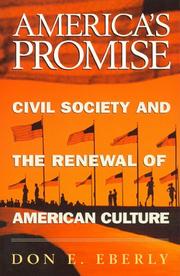
ISBN: 0847692280 0847692299 9780847692293 Year: 1998 Publisher: Lanham, Md. : Rowman & Littlefield Publishers,
Abstract | Keywords | Export | Availability | Bookmark
 Loading...
Loading...Choose an application
- Reference Manager
- EndNote
- RefWorks (Direct export to RefWorks)
Citizenship --- Civil society --- Political participation --- Values --- Nationalité --- Société civile --- Participation politique --- Valeurs (Philosophie) --- Political aspects --- Aspect politique --- Citizenship - United States --- Civil society - United States --- Political participation - United States --- Values - Political aspects - United States
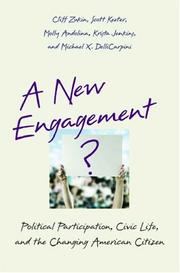
ISBN: 9780195183160 9780195183177 0195183177 0195346041 0198040393 1429438363 1280907878 9786610907878 0199884757 0195183169 Year: 2006 Publisher: New York ; Oxford : Oxford University Press,
Abstract | Keywords | Export | Availability | Bookmark
 Loading...
Loading...Choose an application
- Reference Manager
- EndNote
- RefWorks (Direct export to RefWorks)
Seeking answers as to why youngsters differ from their parents when it comes to turning out to vote, this title challenges conventional wisdom that the youth is plagued by a severe case of political apathy. It concludes that, while older citizens participate by voting, youngsters engage by being active in their communities.
Political sociology --- United States --- #SBIB:324H50 --- #SBIB:324H60 --- #SBIB:328H31 --- #SBIB:35H501 --- Politieke participatie en legitimiteit (referenda, directe democratie, publieke opinie...) --- Politieke socialisatie --- Instellingen en beleid: VSA / USA --- Bestuur en samenleving: netwerken, inspraak, participatie, interactief beleid --- Political participation --- Citizenship --- Civil society --- Political Rights - U.S. --- Government - U.S. --- Law, Politics & Government --- Political participation - United States --- Citizenship - United States --- Civil society - United States
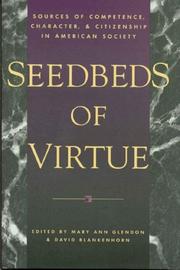
ISBN: 1568330464 9781568330464 Year: 1995 Publisher: Lanham Madison books
Abstract | Keywords | Export | Availability | Bookmark
 Loading...
Loading...Choose an application
- Reference Manager
- EndNote
- RefWorks (Direct export to RefWorks)
Citizenship --- Civil society --- Family --- 308 <73> --- Sociografie. Sociaal economische geografie. Sociale toestand--Verenigde Staten van Amerika. VSA. USA --- Families --- 308 <73> Sociografie. Sociaal economische geografie. Sociale toestand--Verenigde Staten van Amerika. VSA. USA --- United States --- Moral conditions. --- Citizenship - United States. --- Civil society - United States. --- Family - United States.
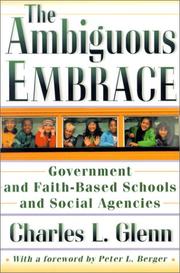
ISBN: 128296433X 9786612964336 140082351X 1400811783 9781400811786 9781400823512 069109280X 9780691092805 0691048525 9780691048529 1400802865 Year: 2000 Publisher: Princeton, N.J. Princeton University Press
Abstract | Keywords | Export | Availability | Bookmark
 Loading...
Loading...Choose an application
- Reference Manager
- EndNote
- RefWorks (Direct export to RefWorks)
This is a time of far-reaching change and debate in American education and social policy, spurred in part by a rediscovery that civil-society institutions are often better than government at meeting human needs. As Charles Glenn shows in this book, faith-based schools and social agencies have been particularly effective, especially in meeting the needs of the most vulnerable. However, many oppose providing public funds for religious institutions, either on the grounds that it would threaten the constitutional separation of church and state or from concern it might dilute or secularize the distinctive character of the institutions themselves. Glenn tackles these arguments head on. He builds a uniquely comprehensive and persuasive case for faith-based organizations playing a far more active role in American schools and social agencies. And, most importantly, he shows that they could do so both while receiving public funds and while striking a workable balance between accountability and autonomy. Glenn is ideally placed to make this argument. A leading expert on international education policies, he was for many years the director of urban education and civil rights for the Massachusetts Department of Education, and also serves as an Associate Minister of inner-city churches in Boston. Glenn draws on all his varied experience here as he reviews the policies and practices of governments in the United States and Europe as they have worked with faith-based schools and also with such social agencies as the Salvation Army and Teen Challenge. He seeks to answer key theoretical and practical questions: Why should government make greater use of faith-based providers? How could they do so without violating First Amendment limits? What working relationships protect the goals and standards both of government and of the organizations that the government funds? Glenn shows that, with appropriate forms of accountability and a strong commitment to a distinctive vision of service, faith-based organizations can collaborate safely with government, to their mutual benefit and that of those they serve. This is a major contribution to one of the most important topics in political and social debate today.
Church and state -- Europe. --- Church and state -- United States. --- Church charities -- Europe. --- Church charities -- United States. --- Church schools -- Europe. --- Church schools -- United States. --- Civil society -- Europe. --- Civil society -- United States. --- Human services -- Contracting out -- Europe. --- Human services -- Contracting out -- United States. --- Social Welfare & Social Work --- Social Sciences --- Social Welfare & Social Work - General --- School management
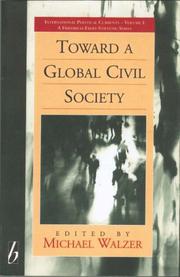
ISBN: 1571810544 Year: 1995 Volume: 1 Publisher: Providence, R.I. Berghahn
Abstract | Keywords | Export | Availability | Bookmark
 Loading...
Loading...Choose an application
- Reference Manager
- EndNote
- RefWorks (Direct export to RefWorks)
Aide sociale --- Aide sociale -- Politique gouvernementale --- Assistance publique --- Assistance sociale --- Benevolent institutions --- Bien être social --- Justice sociale --- Marxism --- Oeuvres sociales --- Openbare welzijnszorg --- Openbare welzijnszorg -- Regeringspolitiek --- Poor relief --- Post-communism --- Post-communisme --- Postcommunisme --- Prestations sociales --- Protection sociale --- Public assistance --- Public charities --- Public relief --- Public welfare --- Public welfare -- Government policy --- Public welfare reform --- Rechtvaardigheid [Sociale ] --- Relief (Aid) --- Social democracy --- Social justice --- Social welfare --- Sociale rechtvaardigheid --- Socialism --- Socialisme --- Socialist movements --- Systèmes d'assistance --- Welfare (Public assistance) --- Welfare reform --- Post-communism. --- Civil society --- Société civile --- Political philosophy. Social philosophy --- Public welfare. --- Social justice. --- Socialism. --- United States --- Europe --- Civil society - United States. --- Civil society - Europe.
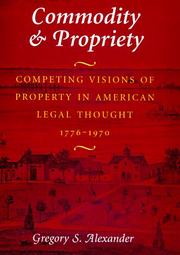
ISBN: 1299104487 0226013529 9780226013527 0226013537 0226013545 9780226013541 9780226013534 0226013537 0226013545 Year: 1997 Publisher: Chicago : University of Chicago Press,
Abstract | Keywords | Export | Availability | Bookmark
 Loading...
Loading...Choose an application
- Reference Manager
- EndNote
- RefWorks (Direct export to RefWorks)
Most people understand property as something that is owned, a means of creating individual wealth. But in Commodity and Propriety, the first full-length history of the meaning of property, Gregory Alexander uncovers in American legal writing a competing vision of property that has existed alongside the traditional conception. Property, Alexander argues, has also been understood as proprietary, a mechanism for creating and maintaining a properly ordered society. This view of property has even operated in periods-such as the second half of the nineteenth century-when market forces seemed to dominate social and legal relationships. In demonstrating how the understanding of property as a private basis for the public good has competed with the better-known market-oriented conception, Alexander radically rewrites the history of property, with significant implications for current political debates and recent Supreme Court decisions.
Property --- Civil society --- Social contract --- Economics --- Possession (Law) --- Things (Law) --- Wealth --- Social aspects --- History. --- Law and legislation --- Social aspects&delete& --- History --- E-books --- United States --- Property - Social aspects - United States - History. --- Civil society - United States - History. --- Primitive property --- property, rights, america, american, united states, usa, history, historical, legal, litigation, law, lawyer, 1700s, 1800s, 1900s, 20th century, scholarly, scholarship, analysis, overview, student, college, university, higher ed, textbook, ownership, proprietary, market, economy, wealth, supreme court, case, judge, jury, civic, definition, thomas jefferson, commercial, republican, era, time period, politics, political, debate.
| Listing 1 - 9 of 9 |
Sort by
|

 Search
Search Feedback
Feedback About UniCat
About UniCat  Help
Help News
News